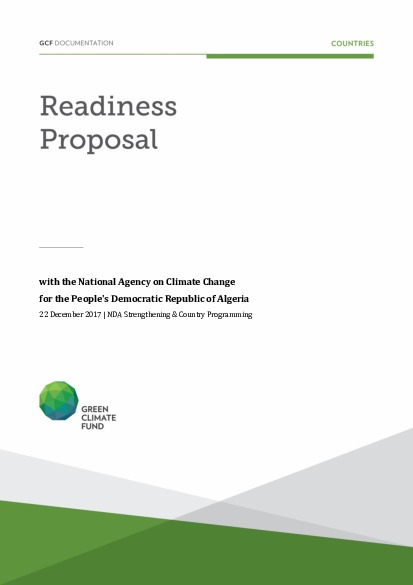NDA Strengthening and Country Programming support for Algeria through National Agency on Climate Change

NDA Strengthening and Country Programming support for Algeria through National Agency on Climate Change
The issue of climate change is in Algeria an important and new challenge. A large part of Algeria belongs to the Mediterranean basin which is a "hot spot" of climate change and should therefore be protected. Algeria, ratified in April 1993, the United Nations Framework Convention on Climate Change (UNFCCC), and fully subscribes to commitments relating to the stabilizing emissions of greenhouse gases to prevent anthropogenic interference with the climate system. By adhering to the Kyoto Protocol in 2005, Algeria has shown its determination to participate in the international effort against climate change and its potential impacts on water resources, natural ecosystems and the sustainability of economic development. All socio-economic sectors and institutions are gradually incorporating aspects related to climate change, particularly in the search for ways of adaptation and mitigation. With no historical responsibility for climate change, any national effort of mitigation should not be economically restrictive or menacing the right of Algeria to development. Algeria has developed an initial strategy against climate change and developed numerous projects for adaptation and mitigation of changes climate. The national strategy is based primarily on four areas: institutional strengthening, adaptation to climate change, mitigation of emissions of GHG and human capacity building. Its implementation mainly concerns the sectors of energy, industry, transport, waste, water resources, agriculture and forests. In this context, there was creation in 2005 of the National Agency for climate change and inventories of greenhouse gas (GHG) emission are carried out periodically.
Algeria also faces the challenges related to food security, to its ecosystems and agriculture resilience, to major risks and to natural resources scarcity. In addition, it shall satisfy the expanding needs of its growing population, in terms of employment, education, health and housing, while the economic and financial environment is aggravated by the significant drop in oil prices. It should be noted as well that Algeria is already contributing for several decades in the mitigation efforts through its energy mix, based essentially on natural gas. The development of its electricity generation capacity is largely based on combined-cycle power plants. A hybrid power plant, combining solar energy and natural gas, is already operational. Besides, Algeria’s efforts to reduce gas flaring emissions are to be pursued and sustained. Algeria’s mitigation strategy covers mainly energy, forests, housing, transport, industry and waste sectors. It is based in particular on the national programs for renewable energy and energy efficiency. This reflects its willingness to pursue its efforts in combating the adverse impacts of climate change. Such programs shall be pursued and sustained so long as Algeria benefits from international support in terms of new and external financial resources, and technology transfer, and capacity building.
As the GCF Focal Point was only appointed a couple of months ago, he has to go through a steep learning curve in order to effectively fulfil the roles and responsibilities of being an interface between the country and the GCF. In addition, it should be noted that Algeria has not mobilized a lot of international climate finance so far and has little expertise in attracting such financing; therefore the readiness activities will increase the capacity of the Algeria stakeholders in mobilizing such financing in order to face the increasing climate challenges in the country. Hence the GCF readiness support will allow the country to overcome and cope with the anticipated challenges associated with climate change, effectively coordinating the various stakeholders in order to develop a country programme. The readiness support will enable the country to access technical support to take advantage of, and learn from, some of the tools and best practices developed by the Fund (such as the recently developed initial best practices options for country coordination and multi-stakeholder engagement). Algeria therefore seeks readiness support for activity 1 (strengthening its Focal Point) and activity 2 (developing a framework of engagement of the Fund) in order to strengthen the capacity of its Focal Point (and NDA when nominated) and help in identifying a suitable institutional arrangement for engaging with the Fund, as well as developing a country programme, which will include adaptation and mitigation programming priorities.